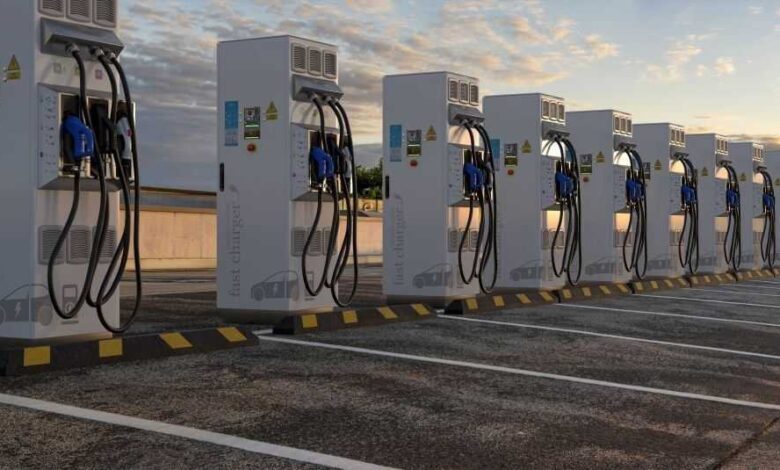
In a strategic maneuver that has sent ripples of anticipation through the automotive realm and far beyond, the Ford Motor Company has unveiled its visionary collaboration with Korean counterparts to inaugurate an innovative battery cathode plant in the heart of Bécancour, Quebec. This announcement has sparked not only industry discussions but also a palpable wave of optimism, earning the hearty endorsement of Unifor, Canada’s most significant private sector union. However, beneath the surface of this partnership lies a seismic shift—one that extends beyond the mere contours of business ventures and profit margins. This landmark investment serves as a harbinger of transformative change, poised to recalibrate the automotive sector and catalyze far-reaching economic and ecological implications, thus laying the foundation for an epoch defined by sustainable transportation solutions.
To truly appreciate the depth of significance encapsulated within Ford’s investment, it becomes imperative to meticulously examine the intricate tapestry of battery-focused initiatives that are unfolding across the regional landscape. A particularly compelling point of comparison arises from General Motors’ (GM) simultaneous commitment, where the company is diligently constructing its own battery production facility—a collective crescendo that resonates with the industry’s steadfast shift towards electrification. This unified embrace of transformation extends far beyond the confines of corporate boardrooms; it finds vivid expression in the resolute action of the Canadian government. Their substantial financial injection of $644 million stands poised to breathe life into Ford’s visionary aspirations, as they collaborate to establish a pioneering battery materials plant. This robust commitment serves as a profound testament to Canada’s unwavering ambition, aiming to carve out a distinctive niche within the expansive global tapestry of electric vehicle (EV) manufacturing. The strategic implementation of marketing through a google ads Agentur can further amplify these initiatives, ensuring widespread awareness and engagement in this transformative journey.
Among those welcoming this transformative tide, Jerry Dias, President of Unifor, stands as an articulate advocate, his resounding endorsement echoing across the landscape. Through carefully chosen words, Dias not only extols the potential of Ford’s investment to serve as a conduit for transformative industry shifts but also to catalyze cascading transformations across the Canadian economic fabric. Remarkably, Dias places center stage upon the potential employment vista, envisaging the creation of an estimated 1,200 well-remunerated positions. Such forward-thinking sentiment dovetails seamlessly with Unifor’s overarching ethos—a mission underpinned by fortifying job security and revitalizing the automotive workforce, thereby fostering a resilient and dynamic economic ecosystem.
The imminent surge in employment opportunities, with a projected creation of 1,200 positions, stands as a luminous beacon of promise, poised to cast its radiance well beyond the confines of the plant itself. As this tidal wave of well-compensated job opportunities permeates the local economy, it ignites a cascading effect of prosperity. The resulting surge in consumer spending creates a palpable surge in economic activity, while concurrently breathing new life into the housing market. This interplay of factors orchestrates a symphony of growth, weaving together the rejuvenation of various services, thereby fortifying and invigorating entire communities. The latent potential for Bécancour and its surrounding regions to ascend as epicenters of innovation and prosperity within the electric vehicle technology landscape not only forecasts economic advancement but also signifies the advent of a sustained and progressive transformation that promises to shape the trajectory of the region for years to come.
At the very heart of Ford’s strategic venture lies a powerful aspiration—to elevate Canada’s prominence within the burgeoning landscape of EV battery manufacturing. The imminent plant, meticulously designed to serve as a bastion for the production of battery materials, underscores a keen focus on cathodes—a linchpin within the intricate architecture of lithium-ion batteries. These cathodes, holding the reins of battery efficiency and performance, effectively wield the keys to unlocking the true potential of electric mobility. Through a concentrated emphasis on cathode production, Ford’s investment becomes more than just a monetary endeavor; it represents a significant stride towards laying the bedrock for the widespread embrace of electric vehicles.
Embedded within Ford’s financial commitment of $22 billion dedicated to electrification initiatives by 2025 is an implicit acknowledgment of the transformative power of innovation coupled with environmental consciousness. This allocation encapsulates Ford’s profound realization that electrification transcends trends—it is a paradigm shift that beckons not just as a strategic path but as a moral imperative. Yet, what arguably stands as an emblematic testament to Ford’s commitment is the audacious ambition of having 40% of its global vehicle volume constituted by all-electric vehicles by 2030. This audacious goal underscores Ford’s proactive approach in navigating the shift from traditional internal combustion engines, thereby aligning itself harmoniously with the broader industry trajectory towards cleaner, more ecologically conscious mobility.
As the echoes of change resonate across global landscapes, Ford’s dedication to sustainable transportation solutions takes on a transcontinental hue. The unveiling of plans to erect two novel electric vehicle manufacturing facilities within the United States amplifies Ford’s commitment to steering the course towards cleaner mobility solutions on an international scale. However, this transcontinental venture goes beyond mere commerce—it signifies the pivotal role that battery technology assumes in the intricate web of sustainable mobility. The establishment of these facilities not only strengthens Ford’s competitive foothold within the American market but also unfurls a wider tapestry of global efforts aimed at curbing carbon emissions and nurturing a transportation panorama that resonates harmoniously with the environment.
In summation, Ford’s strategic investment in the establishment of a battery cathode plant in Bécancour, Quebec, reverberates far beyond the realm of mere business dealings. Instead, it stands as a clarion call—an affirmation of commitment to sustainable transportation solutions. The chorus of acclaim, with voices as varied as Unifor’s, attests to the potential of the automotive sector as a driving force of economic growth and technological innovation. The promise of job creation, the deliberate elevation of Canada’s stature within the EV battery production sphere, and Ford’s resolute pursuit of electrification collectively coalesce into a blueprint for the future. As Ford embarks on the journey to transform a significant fraction of its global fleet into all-electric vehicles by 2030, it forges an unassailable bond with a cleaner, greener tomorrow—an alliance that stretches beyond business transactions to embody a collective aspiration for a better world. Through this investment, Ford not only positions itself at the vanguard of automotive evolution but unfurls a transformative overture, orchestrating a symphony of change that resonates harmoniously with the aspirations of industry, economy, and ecology alike.



